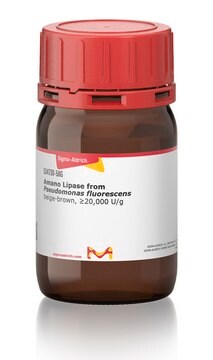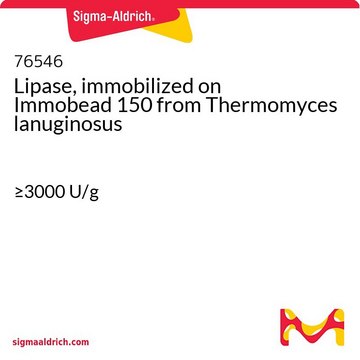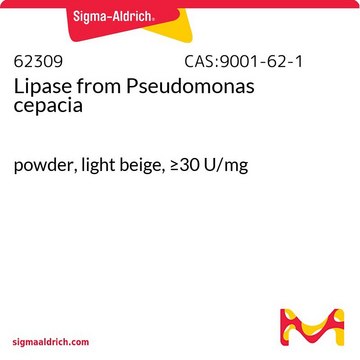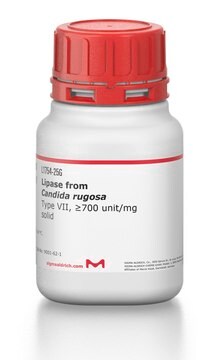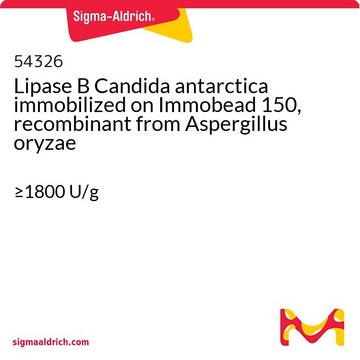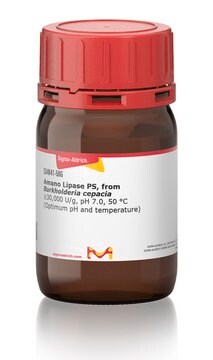54327
Lipase, immobilized on Immobead 150 from Pseudomonas cepacia
≥900 U/g
Synonim(y):
Immobilized Lipase
Zaloguj sięWyświetlanie cen organizacyjnych i kontraktowych
About This Item
Kod UNSPSC:
12352204
NACRES:
NA.54
Polecane produkty
pochodzenie biologiczne
bacterial (Pseudomonas cepacia)
Postać
powder (or beads)
aktywność właściwa
≥900 U/g
kolor
white to off-white
Zastosowanie
life science and biopharma
temp. przechowywania
2-8°C
informacje o genach
Burkholderia spp. ... BURCE16_RS29975(56665765)
Opis ogólny
Research area: Cell Signaling
Lipases are water-soluble, ester hydrolases. Long aliphatic chain acyl esters of cholesterol (cholesteryl esters), triacyl esters of glycerol (triacylglycerols), acyl esters of long chain alcohols (wax esters), diacyl esters of glycerol (diacylglycerols), and monoacyl esters of glycerol, are some of the common substrates for lipases.
Lipases are water-soluble, ester hydrolases. Long aliphatic chain acyl esters of cholesterol (cholesteryl esters), triacyl esters of glycerol (triacylglycerols), acyl esters of long chain alcohols (wax esters), diacyl esters of glycerol (diacylglycerols), and monoacyl esters of glycerol, are some of the common substrates for lipases.
Zastosowanie
Lipases are used industrially for the resolution of chiral compounds and the transesterification production of biodiesel.Lipase, immobilized on Immobead 150 from Pseudomonas cepacia has been used in enzymatic hydrolysis of polylactic acid (PLA). It has also been used as biocatalysts in lipase-catalyzed kinetic resolution reactions.
Działania biochem./fizjol.
Lipases catalyze the hydrolysis of triacylglycerols into glycerol and free fatty acids.Lipases are known to regulate energy metabolism of the cell. Lipolysis is highly essential for cellular uptake or release of fatty acids (FAs) and glycerol. Gastrointestinal lipolysis catabolizes dietary fat. Vascular lipolysis hydrolyzes lipoprotein-related triglycerides (LTPs) in the blood. In the intracellular domain, lipolysis catalyzes the breakdown of triglycerides (TGs) stored in LDLs for exportation of fatty acids (fat) (fat tissue) or metabolism (non-adipose tissue).
Definicja jednostki
1 U corresponds to the amount of enzyme which liberates 1 μmol butyric acid per minute at pH 7.5 and 40°C (tributyrin, Cat. No. 91010, as substrate)
This page may contain text that has been machine translated.
Kod klasy składowania
11 - Combustible Solids
Klasa zagrożenia wodnego (WGK)
WGK 3
Temperatura zapłonu (°F)
Not applicable
Temperatura zapłonu (°C)
Not applicable
Środki ochrony indywidualnej
Eyeshields, Gloves, type N95 (US)
Certyfikaty analizy (CoA)
Poszukaj Certyfikaty analizy (CoA), wpisując numer partii/serii produktów. Numery serii i partii można znaleźć na etykiecie produktu po słowach „seria” lub „partia”.
Masz już ten produkt?
Dokumenty związane z niedawno zakupionymi produktami zostały zamieszczone w Bibliotece dokumentów.
Florian Golombek et al.
ACS omega, 6(43), 29192-29200 (2021-11-09)
Deracemizations are clearly preferable to kinetic resolutions in the production of chiral molecules from racemates, as they allow up to 100% chemical and optical yield. Here we present a new process route for multienzymatic deracemizations that is relevant for reaction
Song-Hua Hu et al.
Cell reports, 38(11), 110509-110509 (2022-03-17)
Protein fatty acylation regulates numerous cell signaling pathways. Polyunsaturated fatty acids (PUFAs) exert a plethora of physiological effects, including cell signaling regulation, with underlying mechanisms to be fully understood. Herein, we report that docosahexaenoic acid (DHA) and eicosapentaenoic acid (EPA)
Guan-Chun Chen et al.
Biotechnology letters, 33(3), 525-529 (2010-11-04)
Triacylglycerol lipase from Pseudomonas cepacia and Fe(3)O(4) magnetic nanoparticles were encapsulated simultaneously within biomimetic silica through the catalysis of polyallylamine. The encapsulation efficiency reached 96% with an activity recovery of 51%. After 5 h at 37°C, the activities of the
Industrial applications of microbial lipases
F. Hasan et al.
Enzyme and Microbial Technology, 39, 235-251 (2006)
Nasz zespół naukowców ma doświadczenie we wszystkich obszarach badań, w tym w naukach przyrodniczych, materiałoznawstwie, syntezie chemicznej, chromatografii, analityce i wielu innych dziedzinach.
Skontaktuj się z zespołem ds. pomocy technicznej
